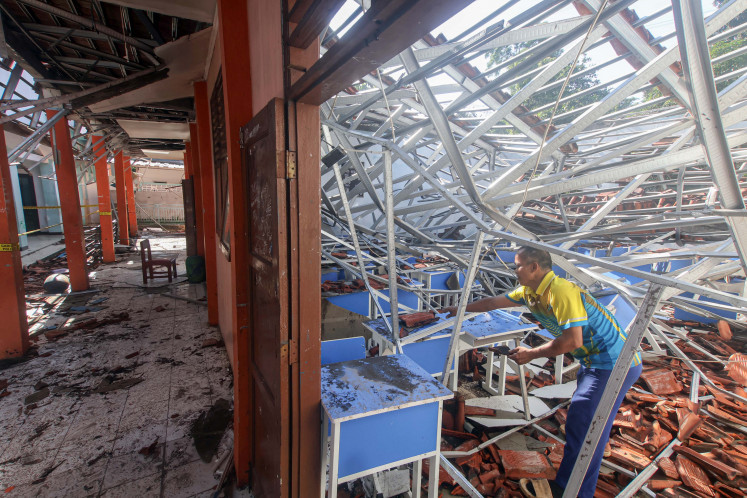Popular Reads
Top Results
Can't find what you're looking for?
View all search resultsPopular Reads
Top Results
Can't find what you're looking for?
View all search resultsCountry’s terror network remains intact: BNPT
The country’s counterterrorism agency has detected continuing activity by terrorist organizations despite the fact that many terrorist suspects have either been jailed or killed since the first Bali bombing in 2002
Change text size
Gift Premium Articles
to Anyone
T
he country’s counterterrorism agency has detected continuing activity by terrorist organizations despite the fact that many terrorist suspects have either been jailed or killed since the first Bali bombing in 2002.
Based on its surveillance, the National Counterterrorism Agency (BNPT) said terrorist networks within the country remained intact.
“Terrorist activity in Indonesia has not stopped yet. Jamaah Islamiyah [JI] has reemerged through new channels. There has been a wave of [terror suspects] released since 2007, also their international connections have been reestablished,” BNPT operations deputy Brig. Gen. Tito Karnavian said during the Jakarta International Defense Dialogue late Wednesday.
Tito said that terrorist groups in Indonesia could be divided into several mainstream groups namely JI, the Islamic State of Indonesia (NII), the Jamaah Ansharut Tauhid (JAT) and Angkatan Muda Islam Nusantara (Al-Amin).
The Indonesian government has launched full-scale investigations and prioritized law enforcement to curb the activities of those terrorist organizations especially following the devastating Bali bombing in 2002 which killed more than 200 people mostly foreigners.
According to BNPT data, more than 400 terrorists were successfully prosecuted in the period between 2002 and 2009. Since 2010, however, a number of terror attacks have occurred. Tito said that the quantity of attacks was higher than the country had experienced before.
Although JI, as an organization, had been inactive since 2002, Tito said, its network remained intact.
“JI is quite a well-structured organization. In terms of overseas connections, it has many relationships with Pakistan and Afghanistan networks,” he said.
“So who were the groups involved in the attacks? Basically they are from the same group,” he said. “We notice at least three JI splinter groups including the JAT, the organization cofounded by the former JI leader Abu Bakar Ba’asyir, the Hisbah which is based in Solo and then the Al-Tawhid wal-Jihad.”
Last year, a series of mail bomb attacks and a planned bombing of a church occurred in Tangerang, Banten. Several suspects have been brought to court.
Also last year, a suicide bomb was targeted at the Cirebon Police office in West Java. The bomber detonated the bomb inside a mosque at a police compound in Cirebon on April 15 that year.
Tito said some of those attacks were linked to paramilitary activities in Aceh and North Sumatra, where there were strong indications that the JAT or its elements were involved in the activities.
Recently, the National Police’s Densus 88 counterterrorism unit killed five suspected terrorists in a raid in Bali. The suspected terrorists reportedly had links to the JAT network.
Meanwhile, BNPT chief Ansyaad Mbai said that the suspected terrorists had planned to launch an attack in parts of Bali, as well as other areas in the country.
Separately on Thursday afternoon, the Densus 88 arrested a suspect identified as Catur P, 40, as they raided a cell phone store in Sumedang, West Java.
The police have been successful in hunting and bringing terrorist suspects to court as with Umar Patek, the man allegedly responsible for the 2002 Bali bombing.
Patek, nicknamed “The Demolition Man”, is standing trial at the West Jakarta District court. He is accused of masterminding the 2002 Bali bombing and assembling explosives that were used in bombings in nine cities on Christmas Eve in 2000.
Patek was captured on Jan. 25, 2011, in Abbottabad, Pakistan, after previously hiding in the Philippines. Tito said the arrest of Patek showed that Indonesia’s terror networks were linked with Pakistan and the Philippines.
Based on these conditions, Tito said that the terrorist threat remained real; the JI network had survived and had created new “vehicles”. There has also been a wave of releases of terror suspects who have promptly reactivated terror activities.
He said these conditions were a challenge for Indonesia in finding an effective way to contain the growth of terror networks, “We have legal constraints here.”
“We also need to strengthen interorganizational coordination, including with the military,” he said.










